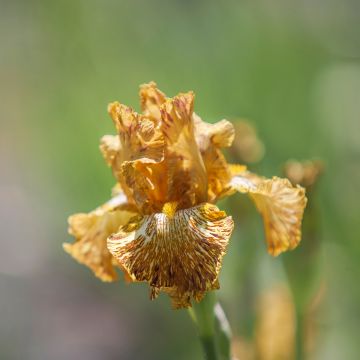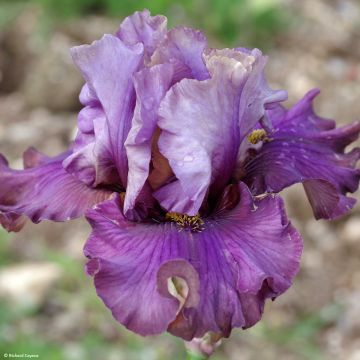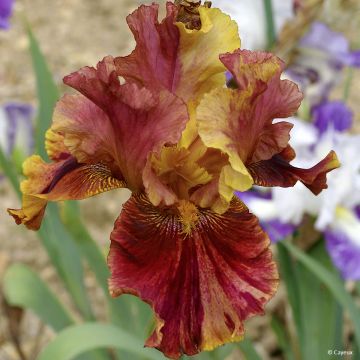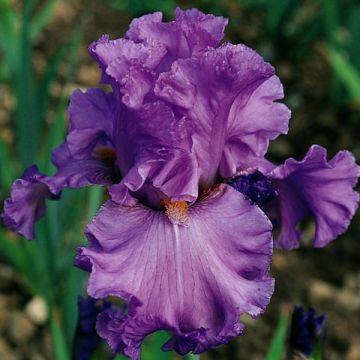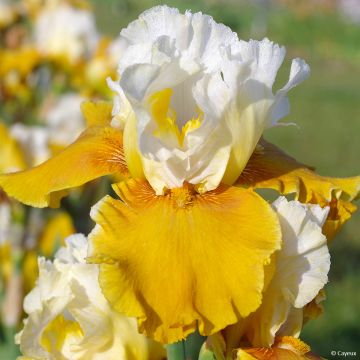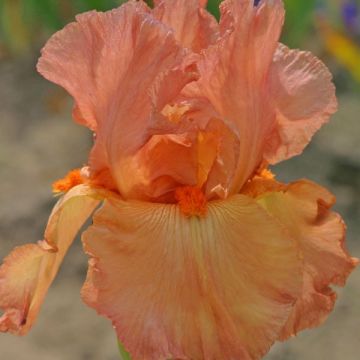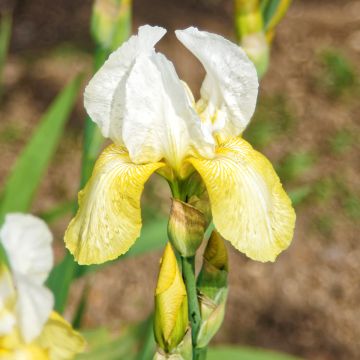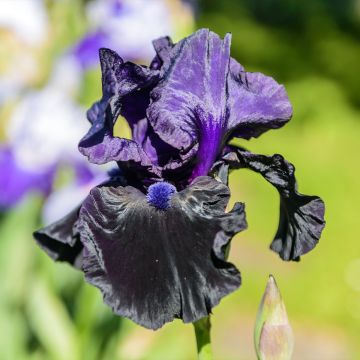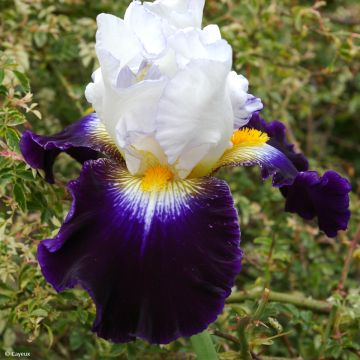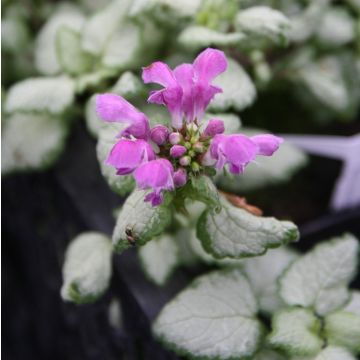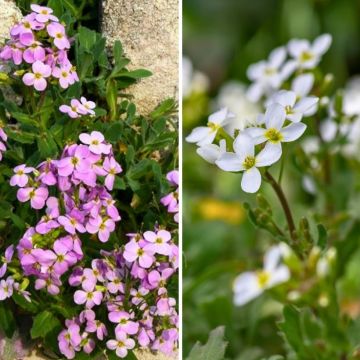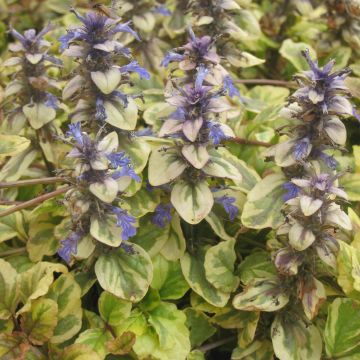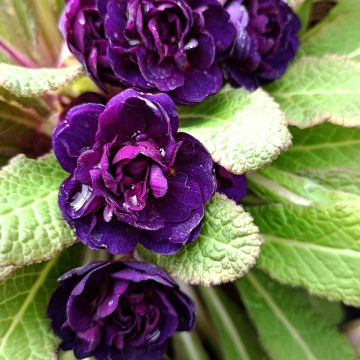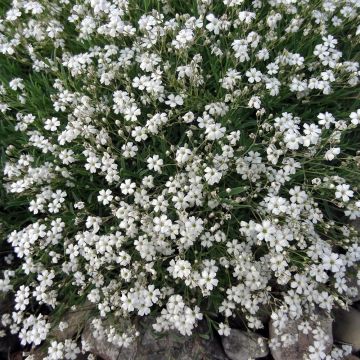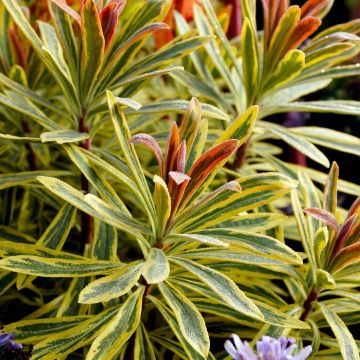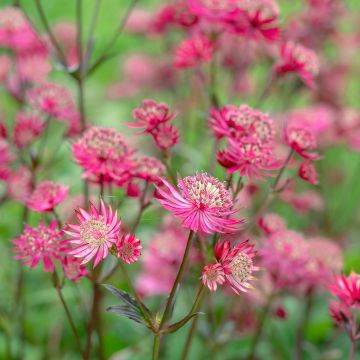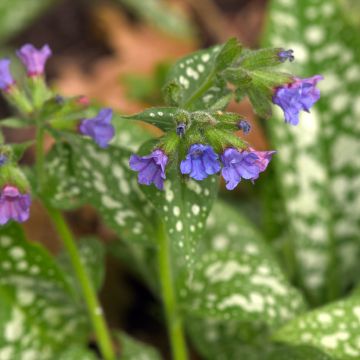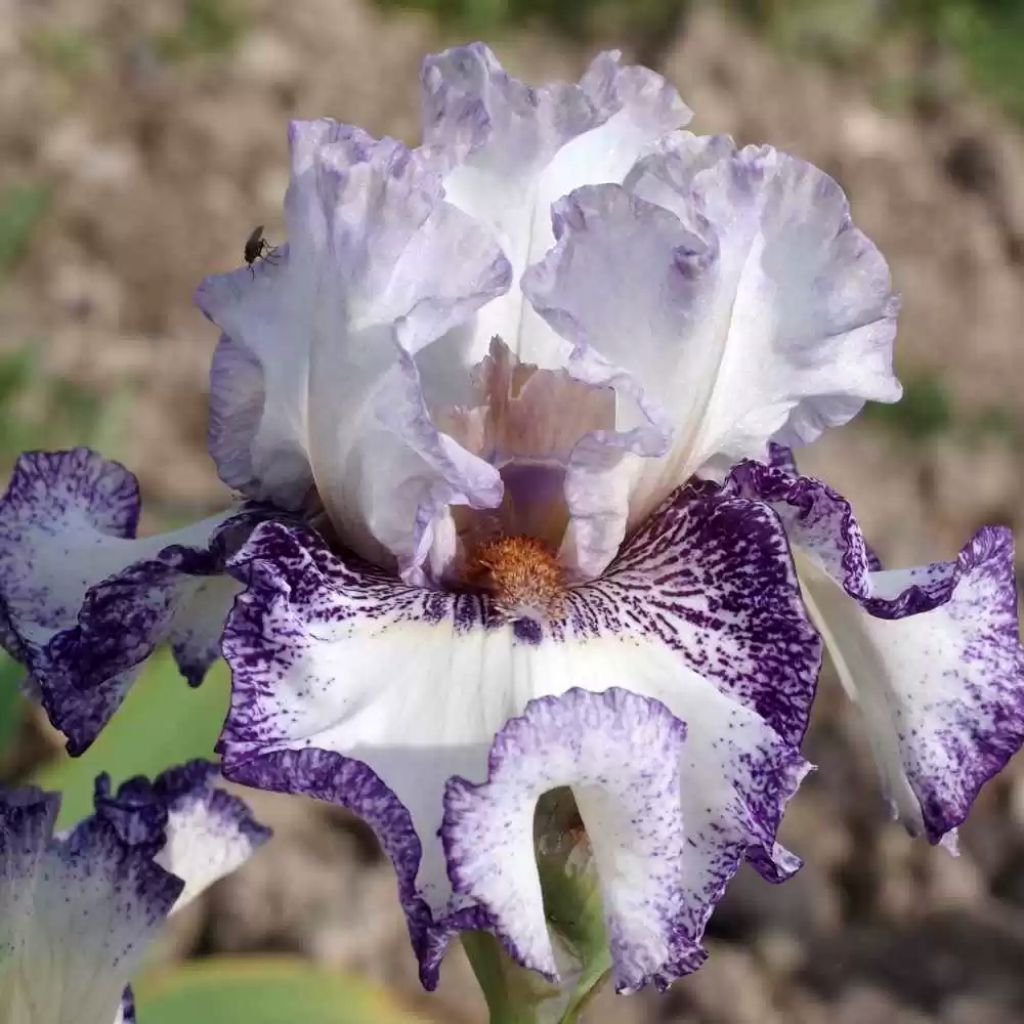

Iris En Pointillés - Bearded iris
Iris En Pointillés - Bearded iris
Iris germanica En Pointillés
German Iris, Bearded Iris
This item cannot be shipped to the selected country
Delivery charge from €5.90
Delivery charge from €5.90
More information
Schedule delivery date,
and select date in basket
This plant carries a 12 months recovery warranty
More information
We guarantee the quality of our plants for a full growing cycle, and will replace at our expense any plant that fails to recover under normal climatic and planting conditions.
From €5.90 for pickup delivery and €6.90 for home delivery
Express home delivery from €8.90.
From €5.90 for pickup delivery and €6.90 for home delivery
Express home delivery from €8.90.
Does this plant fit my garden?
Set up your Plantfit profile →
Description
The 'En Pointillés' Bearded Iris is an intermediate garden iris variety with wavy bicoloured, moderately sized, beautifully formed flowers. This floriferous iris produces 10 to 11 buds per stem. The petals are white and delicately edged with light mauve. The white sepals are finely edged with purple-violet dots. The beards are rust-coloured. It quickly forms beautiful, highly-flowered clumps in May-June, during the iris season. It is sure to delight enthusiasts of unusual flowers, and its strong personality brings life to sunny flower beds, borders, and slopes.
The 'En Pointillés' Iris is a rhizomatous and deciduous perennial plant, with an upright clumping habit starting from spring. Of the plicata type, it is the result of cross-breeding between 'Terre à Silex' and 'Dancing in the Dark'. It will reach a height of approximately 70 cm when in bloom. It spreads in clumps without a theoretical limit, with the centre becoming less dense in favour of the periphery. The sword-like foliage is glaucous green and highly veined. In April, the flower stems appear and will bloom in May. The particularly rich colouration of this plant is, as always with garden irises, enhanced by the texture of the petals and sepals, with strongly wavy edges.
To accompany the irises, choose plants that have similar requirements in terms of soil and exposure. Opt for low-growing species or those with light foliage, which do not obstruct the light needed by the irises and do not compete with them, while offering staggered or non-staggered flowering. For example, Gaura maintains visual appeal throughout the summer and hides the foliage of the iris after flowering. California poppies and love-in-a-mist, which tolerate dry soil, go well with the needs of irises. Perennial geraniums, salvias, and Libertias are also good companions that extend the flowering period. At the base of a wall, the relative shelter from the wind allows for the use of tall irises. If you are concerned about climatic uncertainties, choose intermediate iris varieties, which have better resistance to wind and rain. Slopes, the base of small trees with light foliage, and terraced edges can be stabilised by a dense planting of old varieties that can remain in place and require little care.
The vegetable garden can be enhanced with a few clumps or borders of irises for cut flowers.
Report an error about the product description
Flowering
Foliage
Plant habit
Botanical data
Iris
germanica
En Pointillés
Iridaceae
German Iris, Bearded Iris
Cultivar or hybrid
Other German Iris - Bearded Iris
Planting and care
Do you have a sunny, warm location, rather dry in summer? This is the ideal location for planting irises like 'En Pointillés'! In the shade, they grow but do not flower. They are hardy and do not need winter protection. Well-drained soil is perfect, even if it is rather dry and chalky.
Plant from July to September. This allows the rhizomes enough time to grow new roots before winter. They should be planted as soon as they are purchased for best results. A spacing of 30 to 40 cm for intermediate-sized irises is perfect. Dig a hole that is wide and deep enough, and make a conical mound of soil on which to place the rhizome and the spreading roots. Cover the roots. It is important for the rhizome to be left just above the surface of the soil to avoid rotting. In clay or wet soil, the rhizome should even be left slightly elevated on a slight mound of a few centimetres. To make the soil cling to the roots, lightly firm the soil and water it abundantly after planting. Water 2-3 times if necessary until the plants start growing again. Always consider the direction of growth of the rhizomes by arranging them in a star shape, with buds and leaves facing outward. Plan to divide the irises every 4 years or so to give them fresh soil.
Planting period
Intended location
Care
This item has not been reviewed yet - be the first to leave a review about it.
Spring flowering perennials
Haven't found what you were looking for?
Hardiness is the lowest winter temperature a plant can endure without suffering serious damage or even dying. However, hardiness is affected by location (a sheltered area, such as a patio), protection (winter cover) and soil type (hardiness is improved by well-drained soil).

Photo Sharing Terms & Conditions
In order to encourage gardeners to interact and share their experiences, Promesse de fleurs offers various media enabling content to be uploaded onto its Site - in particular via the ‘Photo sharing’ module.
The User agrees to refrain from:
- Posting any content that is illegal, prejudicial, insulting, racist, inciteful to hatred, revisionist, contrary to public decency, that infringes on privacy or on the privacy rights of third parties, in particular the publicity rights of persons and goods, intellectual property rights, or the right to privacy.
- Submitting content on behalf of a third party;
- Impersonate the identity of a third party and/or publish any personal information about a third party;
In general, the User undertakes to refrain from any unethical behaviour.
All Content (in particular text, comments, files, images, photos, videos, creative works, etc.), which may be subject to property or intellectual property rights, image or other private rights, shall remain the property of the User, subject to the limited rights granted by the terms of the licence granted by Promesse de fleurs as stated below. Users are at liberty to publish or not to publish such Content on the Site, notably via the ‘Photo Sharing’ facility, and accept that this Content shall be made public and freely accessible, notably on the Internet.
Users further acknowledge, undertake to have ,and guarantee that they hold all necessary rights and permissions to publish such material on the Site, in particular with regard to the legislation in force pertaining to any privacy, property, intellectual property, image, or contractual rights, or rights of any other nature. By publishing such Content on the Site, Users acknowledge accepting full liability as publishers of the Content within the meaning of the law, and grant Promesse de fleurs, free of charge, an inclusive, worldwide licence for the said Content for the entire duration of its publication, including all reproduction, representation, up/downloading, displaying, performing, transmission, and storage rights.
Users also grant permission for their name to be linked to the Content and accept that this link may not always be made available.
By engaging in posting material, Users consent to their Content becoming automatically accessible on the Internet, in particular on other sites and/or blogs and/or web pages of the Promesse de fleurs site, including in particular social pages and the Promesse de fleurs catalogue.
Users may secure the removal of entrusted content free of charge by issuing a simple request via our contact form.
The flowering period indicated on our website applies to countries and regions located in USDA zone 8 (France, the United Kingdom, Ireland, the Netherlands, etc.)
It will vary according to where you live:
- In zones 9 to 10 (Italy, Spain, Greece, etc.), flowering will occur about 2 to 4 weeks earlier.
- In zones 6 to 7 (Germany, Poland, Slovenia, and lower mountainous regions), flowering will be delayed by 2 to 3 weeks.
- In zone 5 (Central Europe, Scandinavia), blooming will be delayed by 3 to 5 weeks.
In temperate climates, pruning of spring-flowering shrubs (forsythia, spireas, etc.) should be done just after flowering.
Pruning of summer-flowering shrubs (Indian Lilac, Perovskia, etc.) can be done in winter or spring.
In cold regions as well as with frost-sensitive plants, avoid pruning too early when severe frosts may still occur.
The planting period indicated on our website applies to countries and regions located in USDA zone 8 (France, United Kingdom, Ireland, Netherlands).
It will vary according to where you live:
- In Mediterranean zones (Marseille, Madrid, Milan, etc.), autumn and winter are the best planting periods.
- In continental zones (Strasbourg, Munich, Vienna, etc.), delay planting by 2 to 3 weeks in spring and bring it forward by 2 to 4 weeks in autumn.
- In mountainous regions (the Alps, Pyrenees, Carpathians, etc.), it is best to plant in late spring (May-June) or late summer (August-September).
The harvesting period indicated on our website applies to countries and regions in USDA zone 8 (France, England, Ireland, the Netherlands).
In colder areas (Scandinavia, Poland, Austria...) fruit and vegetable harvests are likely to be delayed by 3-4 weeks.
In warmer areas (Italy, Spain, Greece, etc.), harvesting will probably take place earlier, depending on weather conditions.
The sowing periods indicated on our website apply to countries and regions within USDA Zone 8 (France, UK, Ireland, Netherlands).
In colder areas (Scandinavia, Poland, Austria...), delay any outdoor sowing by 3-4 weeks, or sow under glass.
In warmer climes (Italy, Spain, Greece, etc.), bring outdoor sowing forward by a few weeks.

































